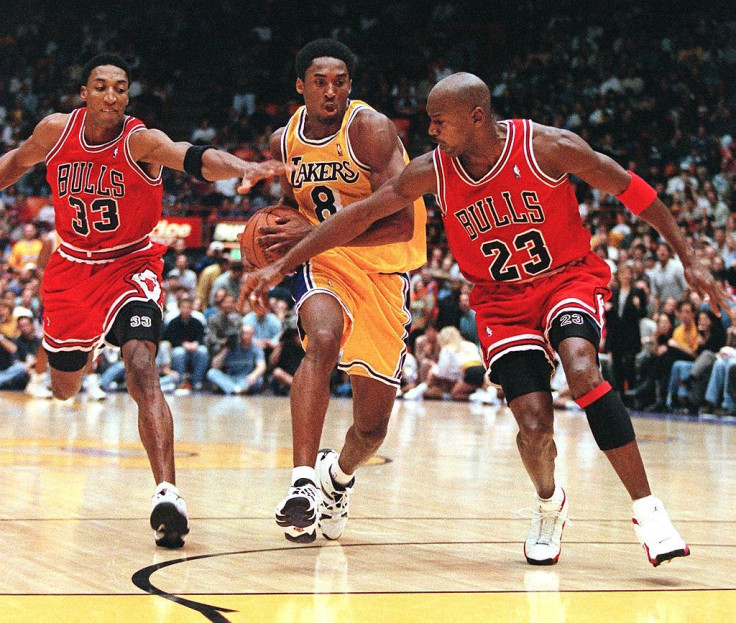Why Did Michael Jordan Leave The Bulls? Jerry Krause, Phil Jackson Contributed To 'Last Dance'

The first two parts of ESPN’s “The Last Dance” were not particularly flattering to Jerry Krause. The former Chicago Bulls’ general manager received most of the blame for breaking up the dynasty that won six NBA championships in eight years.
The name of the docuseries is the same theme that head coach Phil Jackson used for the Bulls’ 1997-1998 season. Jackson signed a one-year contract with Chicago after the 1997 NBA Finals as the Bulls pursued their second three-peat of the decade. The legendary coach said that Krause told him he wouldn’t be brought back after that season, no matter what.
“I don’t care if it’s 82-and-0 this year, you’re [expletive] gone,” Krause infamously told Jackson in his office.
Michael Jordan made it clear that he didn’t want to play for another coach. Underpaid and miffed that he was the subject of trade talks, Scottie Pippen knew his time with the Bulls was up.
A few weeks after Chicago won the 1998 NBA Finals, Jackson officially parted ways with the Bulls. Jordan retired for the second time. Pippen was sent to the Houston Rockets as part of a sign-and-trade.
With their championship core gone, Chicago became one of the league’s worst teams. The Bulls suffered six straight losing seasons, never winning more than 30 games. Tim Floyd went 44-190 as Jackson’s replacement and only lasted 3.5 seasons in the Windy City.
Krause’s haste to rebuild was well-documented in “The Last Dance.” The GM considered hiring Floyd in 1996 and tried to trade Pippen in the summer of 1997. His poor relationship with the team’s two superstars only made matters worse.
But Krause might not have been able to keep Jackson, Jordan and Pippen together beyond 1998 if he tried to do so.
According to Sam Smith, long-time Bulls’ reporter and author of “The Jordan Rules,” Jackson decided that the 1997-1998 season would be his last with the Bulls, even before Krause made his declaration that Chicago would find the coach’s successor.
“Phil, the son of Pentecostal ministers, understood the attention span of a congregation,” Smith recently wrote on nba.com. “One of his greatest strengths was how he dealt with his players as an underrated strategist and spiritual guide, as well. Seven years was an exclamation point in his view for a group and its leader. The message would begin to blur. It was now going into year nine. Phil’s internal alarm clock had rung.”
Smith told Bleacher Report’s Howard Beck on “The Full 48” podcast that Jackson seriously considered leaving the Bulls in 1996 because of his seven-year philosophy. A group of players, led by Ron Harper, convinced Jackson to come back in 96-97 for an eighth year after Chicago set a record with 72 wins.
The Bulls were willing to give Jackson a multi-year extension, but he only wanted a one-year deal. The relationship between Krause and Jackson deteriorated en route to the team’s fifth title.
Must-listen stuff from Sam -- who was obviously there for all of it -- on his long-held contention that Micahel Jordan and Phil Jackson wanted the Bulls' breakup in 1998 as much as anyone ... in part
— Marc Stein (@TheSteinLine) April 21, 2020
because Phil felt he shouldn't coach any one team for more than seven years https://t.co/hjRpHJsrww
Owner Jerry Reinsdorf met with Jackson at his Montana home in 1998 about returning for a ninth season. The coach agreed to a one-year, $6 million contract and said that he wouldn’t come back in 1999.
“He tells Jerry (Reinsdorf) he’ll come back for another year, but he’s done. And Jerry says, ‘we’re gonna go through a rebuilding at some point. I want you to be part of it,’” Smith told Beck, noting that Jackson rejected the offer to stay beyond 1998. “He needs a sabbatical, is already two years past his deadline.”
When Jackson left Chicago, Jordan and Pippen followed suit soon afterward. Dennis Rodman also ended his time with the Bulls after leading the NBA in rebounding during his three-year stint with the team.
What if Jackson and Jordan both returned for the lockout-shortened 1999 season? Could they have won a fourth straight championship and seven rings in nine years?
Jordan was still the best basketball player on the planet. He won the scoring title, regular-season MVP award and Finals MVP award in 1998. Had he remained healthy, the legendary guard would have kept the Bulls in title contention, at worst.
An injury in the summer of 1998 might have prevented Jordan from playing at an MVP-caliber level. Jordan cut his index finger with a cigar cutter, making it much more difficult for him to hold a basketball.
Jordan came out of retirement after a three-year hiatus, spending two seasons with the Washington Wizards. Still an effective scorer, he was not the same player in his late 30’s, unable to lead his team to the playoffs.
Pippen played six more years in the NBA after Chicago’s sixth championship, including one more with the Bulls in 2003-2004. He never made an All-Star team during any of those seasons.
Jackson’s sabbatical lasted just one year. He became the head coach of the Los Angeles Lakers for the 1999-2000 season and won three straight championships. Jackson stepped away from the NBA during the 2004-2005 season, only to return as the Lakers’ coach from 2005-2011, during which time he won two more titles.
Krause was the Bulls’ general manager from 1985-2003. He passed away in 2017.
© Copyright IBTimes 2025. All rights reserved.






















